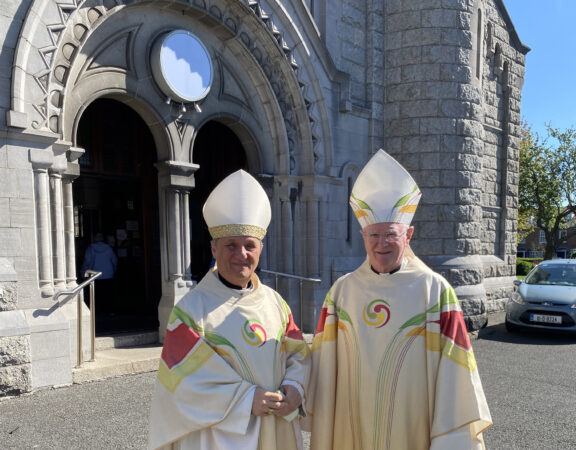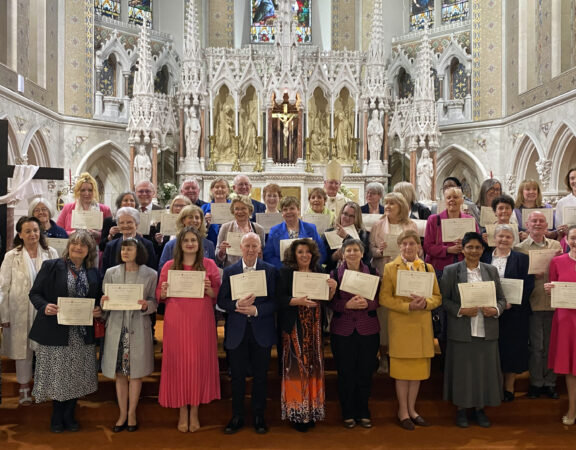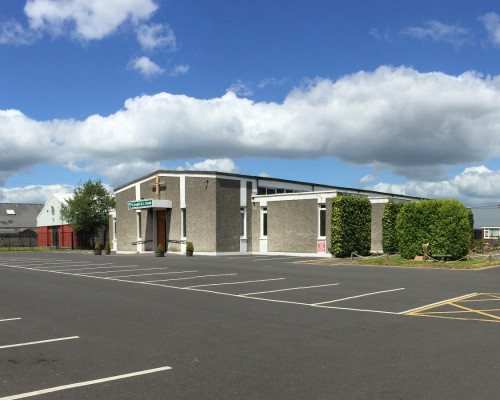PRIESTLY ORDINATION OF CONLETH MEEHAN
AND THE COMMISSIONING OF 10 PARISH PASTORAL WORKERS
AND THE COMMISSIONING OF 10 PARISH PASTORAL WORKERS
Homily Notes of
Most Rev. Diarmuid Martin
Archbishop of Dublin and Primate of Ireland
—————-
Pro-Cathedral, 10th July 2010
Most Rev. Diarmuid Martin
Archbishop of Dublin and Primate of Ireland
—————-
Pro-Cathedral, 10th July 2010
Today is a day of celebration for the Archdiocese of Dublin as we gather for the ordination a new priest, Conleth Meehan, and as we commission 10 new lay Parish Pastoral Workers to minister in our parishes.
I thank Conleth for the way he has prepared for this day and I thank his parents and family, those responsible for his formation in Saint Patrick’s College Maynooth together with Father Liam Rigney, as well as Father Xavier Bizard and Conleth’s friends of the Emmanuel Community. All our prayers are with you this morning, Conleth, and I am sure that they will continue to be with you in your ministry in the years to come.
I thank the new Parish Pastoral Workers for your commitment and enthusiasm and the seriousness which you have shown in your academic and pastoral training. With you I thank Prof. Andrew O’Grady of the Mater Dei Institute and Father John Gilligan and Ellie McKeown who have accompanied you in your preparation over the past year.
The second reading reminds us of the diversity of charisms which the spirit grants to the Church. If today we ordain a priest and commission new pastoral workers we are not talking in any way about a levelling out of all ministries within the Church or of a levelling out of the specific gifts which are given to each one. The Church needs priests. The fact that this year we are ordaining just one new priest is a cause of concern. The number of priests in the diocese is going down, our priests are getting older, and yet there is more work than ever to be done. We thank God for the dedication of great priests of this diocese who today and throughout many years of faithful ministry have in an exemplary way fulfilled and fulfil those words of our first reading: “put yourselves at the service of others”. The Church and indeed Irish society are indebted to your priestly service and ministry.
Lay Parish Pastoral Workers, on their part, have brought a spirit of renewal within our parishes even in this first year of their ministry. Lay pastoral workers are not an alternative to priests. They exercise a specific ministry as baptized lay men and women which has already produced positive fruit in encouraging an even wider participation of lay people in parish life. I thank the first group for the work they have done during the past year and I congratulate the new group which will be commissioned during this Mass. The Church needs priests; the Church also needs committed lay persons; both charisms, though distinct, belong together.
The priest has a specific and irreplaceable mission which he needs day-by-day to cultivate and deepen, not just in order to be more effective pastorally, but as a particular understanding of identity in life. The priesthood is a calling which cannot be reduced to a 9 to 5 assignment, after which priestly identity is switched off or dimmed down. Priesthood is not simply a function to be carried out at certain times. Priesthood belongs to the identity of the priest as a person; it is a question of identification with Jesus Christ in his mission; it is a question of trying to reflect in our lives, with all our human weakness and self-centeredness, the self-giving love of Jesus Christ. Knowing Jesus Christ and being like him is the characteristic of priestly life. That personal knowledge of Jesus comes especially from prayer, from reflection on the Word of God and from the celebration of the Eucharist for the people of God.
Priesthood is a personal gift which must elicit a personal response and personal renewal. But priesthood is never something which brings with it status, or privilege, or caste in a worldly sense. Priesthood is a ministry of the Church, a ministry within the Church and a ministry for the Church. No one is a priest just by themselves or for themselves.
The Archdiocese of Dublin is happy to see a growing commitment of lay men and women who wish to be active in the pastoral structures of the diocese. There is still a long way to go. We have excellent Parish Pastoral Councils which have shown the way forward in enriching ministry. We also have Pastoral Councils which have not yet grown in their task and indeed in a small number of cases Pastoral Councils which may not have been allowed to grow because of their priest. Let me say this: the specific authority of a priest is abused if he does not welcome and foster full participation of lay men and women in the activity of his parish. The second reading again indicates for us the style of interaction which should exist between priest and lay persons: “Welcome each other… without grumbling. Each one of you has received a special grace, so like good stewards responsible for all these different graces of God, put yourselves at the service of others”.
The key to ensuring that that hospitality and service become truly effective is the bond of love, a love which must always be sincere and which, again as the reading stresses, can overcome many offenses and hurts, while rancour and disunity only result in strife. The Gospel reading reminds us that the first qualification required for anyone who assumes ministry in the Church is the ability to love Jesus. The greater our love of Jesus, the more effective our ministry will be.
On a diocesan level I hope that in autumn we will have in place an ad-hoc Diocesan Pastoral Council which will take forward the work of drawing-up a framework for a formal Pastoral Council. This preliminary process should be completed within about two years. The ad-hoc Council will engage in a broad consultation with various groups both on a diocesan level and within parishes and begin to put together the outline of a diocesan pastoral plan. We need common strategies to address the pastoral challenges of our times. We have to set targets regarding our working together for evangelisation, renewal, and mission. We have to look at catechesis, sacramental preparation, and on-going formation in the faith. We have to renew the charitable and social commitment of the Church to respond to a changing social situation.
Reform of structures requires not just business and organizational experience and acumen. It requires deep renewal in the faith and the ability to look anew at the essentials of our faith and how that faith can be lived and spread in the specific conditions of our time. I stress again just how much I feel that knowledge of the scriptures should be at the heart of our renewal. Looking back at our project of making Saint Luke’s Gospel better known, I can see that one large obstacle is that many people do not yet know how to read the scriptures prayerfully. Perhaps people have too little time. Perhaps people have become afraid of being alone with their own heart. Perhaps we as priests have ourselves not made sufficient progress in our knowledge of the scriptures and in our ability to transmit that message.
Catholicism in Ireland and Irish Catholicism are changing. There is no point in thinking that things have not changed radically and in many cases I believe we are not addressing all the dimensions of that change.
The Church lives within a particular society and in a particular culture. The life of the Church is shaped by that culture, but the Church must also in its own unique way influence and shape that culture. The primary responsibility of working to ensure that the principles of the Gospel are transmitted to and influence society and the “public square” belongs to lay men and women. They live and work in the world and have the appropriate expertise and knowledge. The Catholic Church in Ireland requires a more critical engagement with the changing society, even when the values that spring from the Gospel do not win popular acceptance. Questions about the family, marriage and sexuality, the protection and transmission of life are vital questions about which the Christian message has a vital contribution to bring. Christians have the obligation to witness these values by their own lives.
Today is a day of celebration for the Archdiocese of Dublin. We come to ordain a new priest. We commission new Parish Pastoral Workers and as a presbyterate and as the Christian community in the Archdiocese of Dublin we commit ourselves to renewal. We recognise the failings and betrayal of the past. We will never forget its victims and survivors. Our response to them is also renewal: purifying the Church, turning back to Jesus Christ and his teaching in order to form a community like that of the early Church, devoted to “the apostles’ teaching and fellowship, to the breaking of bread and the payers… with glad and generous hearts, prising God and having the goodwill of all the people” where “day by day the Lord will add to our number” (Acts 2, 42 and 47)
Homily Notes ofArchbishop of Dublin and Primate of IrelandPro-Cathedral, 10 July 2010









